Hong Kong is one of the most eye-catching and vibrant places on Earth. A land of great food, awesome sights, warm evenings, skyscrapers and famous movie stars – Hong Kong is lively enough to awaken the dead. By Ed Roberts.
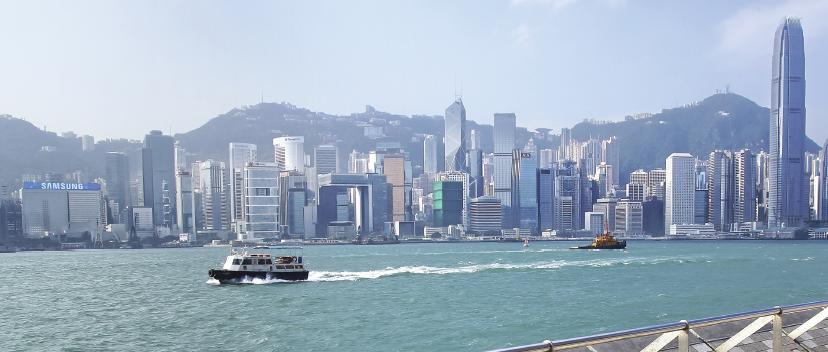
Hong Kong punches well above its class when it comes to attractions to keep your average visitor out of trouble. It’s a small place with a massive population offering many curiosities and hidden adventures per square mile. This former British colony will forever be a go-to area for the seasoned traveller and long distance business men looking to lose themselves.
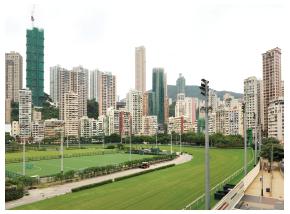 Everybody knows somebody that lives or has lived in Hong Kong. It’s just one of those places. It’s an attractive place for multi-nationals to set up a headquarters not only because of its time distance from the USA and Europe for the stock markets, but also because it’s always had a futuristic and progressive edge. For a long time it’s been a gateway to China and the Far East. Much is familiar with a foreign twist to the western visitor. Yet it’s also a microcosm of the world market in action. For instance, take Chungking Mansions on Nathan Road in Tsim Sha Tsui. The fabled shopping and housing complex is home to shops and restaurants run by people from no less than 30 different nations. Commerce appears to be the main language in Hong Kong.
Everybody knows somebody that lives or has lived in Hong Kong. It’s just one of those places. It’s an attractive place for multi-nationals to set up a headquarters not only because of its time distance from the USA and Europe for the stock markets, but also because it’s always had a futuristic and progressive edge. For a long time it’s been a gateway to China and the Far East. Much is familiar with a foreign twist to the western visitor. Yet it’s also a microcosm of the world market in action. For instance, take Chungking Mansions on Nathan Road in Tsim Sha Tsui. The fabled shopping and housing complex is home to shops and restaurants run by people from no less than 30 different nations. Commerce appears to be the main language in Hong Kong.
Hong Kong consists of several territories that include Hong Kong Island, the Kowloon Peninsula, the New Territories and 200 other islands. Much of Hong Kong's terrain is hilly to mountainous with steep slopes meaning less than 25 per cent of the territory's landmass is developed. A further 40 per cent of the remaining land area is reserved as country parks and nature reserves. Most of the territory's urban development exists on Kowloon peninsula, along the northern edge of Hong Kong Island, and in scattered settlements throughout the New Territories. This is why Hong Kong is so densely populated considering the actual area of the territory as a whole. Almost 90 per cent of Hong Kong citizens live in a high rise apartment.
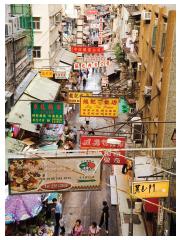 Hong Kong has enjoyed a rich history, having been a British protectorate since the mid 19th century after bartering for opium rights. Chinese sovereignty was returned to the territory in 1997 – returning to Communist rule. A time of uncertainty began that eventually resulted in a significant set of changes that barely sent a ripple of concerns beyond its borders.
Hong Kong has enjoyed a rich history, having been a British protectorate since the mid 19th century after bartering for opium rights. Chinese sovereignty was returned to the territory in 1997 – returning to Communist rule. A time of uncertainty began that eventually resulted in a significant set of changes that barely sent a ripple of concerns beyond its borders.
The handover saw a huge rise in people leaving Hong Kong for the UK, Australia, Canada (especially Vancouver) and the USA. There was widespread fear that the standard of day-to-day life would deteriorate under Chinese rule. However, despite the worries, it has remained as good a place to live and visit as it ever was.
Hong Kong is literally swarming with places to visit and activities to get involved in. No trip to the area is complete without witnessing the early evening spectacle, where the city’s skyline comes alive with a synchronised light show. This is best viewed from the Kowloon Side of the bay. Along the promenade you will find the Avenue of Stars where you can pose with a giant statue of Bruce Lee and see handprints of international movie stars like Jackie Chan, Tony Leung Chui Wai and Maggie Cheung.
Moving house in Hong Kong could provide an unusual set of challenges for removal firms. Just stop and think about the climate. Add to this the sheer quantity of residents that live in high rise blocks down narrow corridors and the realities begin to dawn on you. Narrow streets probably provoke a need for smaller vans along with insane volumes of traffic.
One visit to Hong Kong and you will be quick to embrace its similarities to back home, but the differences will keep you coming back for more. The ebb and flow of a pulsing and vital city will stay with you for years after you’ve left.
Photos: Happy Valley racecourse; a busy street.
Hong Kong on film
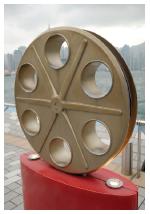 Hong Kong is famous for its contribution to cinema since the 1960s being the world’s third largest producer after the USA and India. It is home to the Far East’s biggest film stars of all time: Bruce Lee, Jackie Chan, Chow Yun Fat, Leslie Cheung, Stephen Chow and Michelle Yeoh. Since the handover in 1997 it has continued to nurture stars and directors to present some ‘World Cinema’ classics. Besides the afore mentioned actors, Hong Kong also spawned filmmakers like John Woo, The Shaw Brothers, Wong Kar Wai and Andrew Lau who are responsible for movies like Hard Boiled, Enter The Dragon, In The Mood For Love, Chungking Express, The Killer, Police Story and Infernal Affairs. The Hong Kong film industry is showing no signs of slowing down either.
Hong Kong is famous for its contribution to cinema since the 1960s being the world’s third largest producer after the USA and India. It is home to the Far East’s biggest film stars of all time: Bruce Lee, Jackie Chan, Chow Yun Fat, Leslie Cheung, Stephen Chow and Michelle Yeoh. Since the handover in 1997 it has continued to nurture stars and directors to present some ‘World Cinema’ classics. Besides the afore mentioned actors, Hong Kong also spawned filmmakers like John Woo, The Shaw Brothers, Wong Kar Wai and Andrew Lau who are responsible for movies like Hard Boiled, Enter The Dragon, In The Mood For Love, Chungking Express, The Killer, Police Story and Infernal Affairs. The Hong Kong film industry is showing no signs of slowing down either.
Photo: Sculpture on the Avenue of Stars.
Gambling
It would appear that betting is the national sport in Hong Kong. Legal betting generates more tax revenue for the government than anything else and the Hong Kong Jockey Club is the territory’s biggest employer.
Gambling has been regulated in Hong Kong since 1977 and it has been illegal to place a bet with a bookie or number runner ever since. The Hong Kong Jockey Club is also a registered not-for-profit charity organisation, donating up to HK$ 1 m per year to: community service; education and training; medical and health; and sports and culture. Gambling is a constant cause of concern with ‘gambling addiction’ being a major problem. Police task forces have been permanently set-up to stop illegal gambling syndicates too.
Hong Kong: it’s not China!
By Rob Chipman, Asian Tigers Mobility, Hong Kong
Hong Kong’s official status is that of a Special Administrative Region of the People’s Republic of China. Hong Kong is often referred to as the SAR or HKSAR. This is important because the rules that apply in HKSAR are quite different that those that govern Mainland China.
Hong Kong SAR is a free port and has been so for most of its commercial history. There are no tariffs on general imports. There are no limits on the size, value or number of HHG/PE shipments and shippers can bring in multiple sea and air shipments. There are duties on liquors (but not on wine) and tobacco products. Non-perishable food and foodstuffs can be imported in small amounts, in original packaging.
Documentation is simple. The shipper does not need to be present or even in HKSAR when the shipment arrives and is cleared. What is needed is a clear copy of the shipper’s passport (the pages with the photo and personal details) and an authorization letter signed by the shipper. The letter can be written in simple, plain English.
An inventory is required, as well as a declaration of any dutiable items. There is very little, if anything beyond that. Most shipments clear customs without physical inspections. Those shipments that the HKSAR Customs and Excise Department does select for physical inspections are normally inspected at the residence at the time of delivery.
Family pets such as cats and dogs can be imported provided a few requirements are met, including a permit from the Hong Kong SAR. That permit does require some advanced planning including a health certificate from the country of origin. Quarantine may be required depending on the country of origin, and changes from time to time.
If quarantine is required, it must take place at one of the few HKSAR facilities. These facilities are of a high standard, and are often fully booked so begin this process early on in any relocation.
Automobiles can be imported into Hong Kong. To do so, the automobile must be right-hand drive, and it must successfully pass safety, exhaust and noise emission standards. There is a first registration fee that is calculated on a sliding scale, but will normally be about 100% of the market value.
Motorcycles can also be imported under similar rules and requirements. The first registration fee for motorcycles is about 35% of the market value.
To summarise, the HKSAR is a simple and easy city for relocations. The customs clearance is straightforward, quick and easy. There are a few rules to follow, so check with your agent in the HKSAR early on in the relocation process and things will likely go very smoothly.
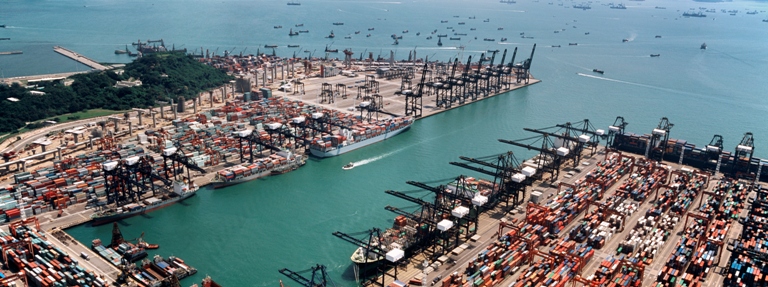
Hong Kong - The Simplest Port
Hong Kong is one of the busiest and most efficient international container ports in
the world handling around 22 million TEUs in 2013. Not only is Hong Kong efficient, it is for the moving industry, one of the simplest ports to do business with as Patrick O’Donnell from Links Moving Asia, which has an office in HK explained.
He said, “Hong Kong has no GST (VAT) on the import and export of household effects and no requirement for the owner to have a work permit, so they’ve made it really easy for people to ship things in and out,” said Patrick. “The containers clear customs very quickly and the shipping lines give us just three days to collect them before charging demurrage.”
Patrick explained that Hong Kong has very narrow streets and steep hills, so there are lots of shuttle deliveries, even from 20ft containers. “Most of the modern buildings have lifts to every floor, rather than to every two as is often the case in places like Singapore, so we don’t often have to do a staircase walk,” said Patrick. “In some of the older buildings where we do have to use the stairs, we make an extra charge depending on the number of floors we need to climb. Sometimes we need to arrange a hoist, which can be quite expensive, but we know the tower blocks pretty well so we know well in advance if a hoist will be required and can quote accordingly.”
Those partial to the occasional tipple benefit from the lowest beer and wine prices in Asia. “The government dropped the wine and beer tax six or seven years ago, so Hong Kong has become the centre for wine in Asia,” said Patrick. “The import levels are incredible; the place would be awash if all the bottles were opened at the same time!” Sadly, for some, spirits are still taxed.
One aspect of moving to Hong Kong that can be expensive is taking the family car. Owners are charged a first registration fee of 70% of the current value of the vehicle. Despite the high charge some people do ship expensive cars such as Bentleys from Europe and still make a saving on the showroom price in HK. As a former British colony, cars drive on the left, so right-hand drive is the best option.
Expats relocating to Hong Kong are initially granted a one year work permit, which is replaced by a series of three two-year permits before they can apply for full HK residency. Education is considered very important by the authorities and applicants are usually required to have a university degree. In any event applicants must demonstrate they have a skill that is not readily available locally.
Patrick’s advice to agents is to remember that they have only three days to clear the terminal and to make sure their client’s property will be ready to move in to. If there are delays SIT and warehouse charges will become payable, which will be expensive.
Photo: Hong Kong Container Port.
Click here to view the next Editor's pick